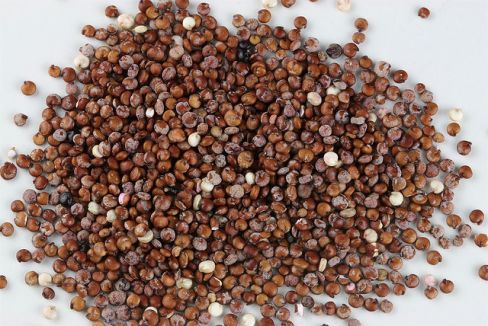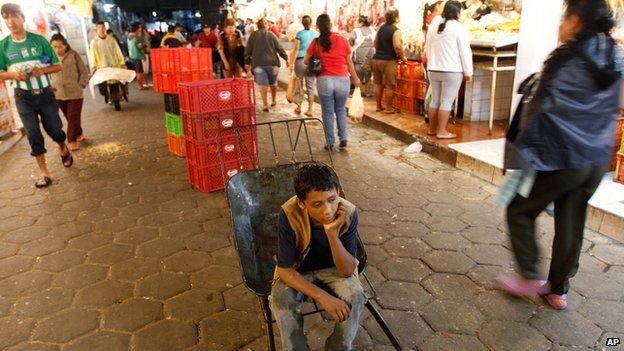
Bolivia's Quinoa Politics
August 1, 2014 - WorldPolicyBlog
By Hayato Watanabe
It seems the United States' latest food obsession is quinoa, a protein-packed grain traditionally cultivated by generations of indigenous Bolivians. As American quinoa cravings grow, Bolivia has enthusiastically risen to the task, ramping up production and showering the West with a seemingly endless supply of this hearty grain. However, while the quinoa boom has created a unique opportunity for Bolivia to recover from years of sluggish growth, it presents a challenge for the leadership in La Paz to manage this unique economic opportunity. Bolivia must evaluate the consequences of mass quinoa production and take the steps necessary
to avoid a future commodity crisis.
The West has "discovered" quinoa and, as many observers have pointed out, the economic results are encouraging. Laborers once living at the edge of poverty are seeing promising returns on quinoa farming. It is helping to close the income gap, particularly amongst indigenous farmers that have formed a solid bloc of support for socialist President Evo Morales.
Morales has rallied for these underrepresented communities as economic instability creates ongoing social crises like high child mortality and adult illiteracy rates. Bolivia's economy grew an estimated 6.5 percent last year, astounding for a country historically stressed by crippling inflation since the mid-80s. In sum, Bolivia's economy is flourishing despite the slow growth and political turmoil that is plaguing its South American neighbors.
Though these figures are promising, the Bolivian economy is still very fragile. It is risky for the country to prop up its economy on an Andean superfood, which may well fizzle out when the next big fad emerges. Now is the time for Bolivia to capitalize on its economic vitality and take the initiative to ensure a healthy economic future.
The country must diversify, rather than perpetuate, its single-commodity economy, which, while profitable in the short term, could collapse at any moment. Bolivia has a troubled history of using commodity booms as a crutch for economic growth, such as when the modern canning process created a high demand for tin. Bolivia indiscriminately tapped into its mining reserves and rode the economic wave into ruin, depleting its resources and defaulting on its sovereign foreign debt.

There is a looming fear among government leaders and non-quinoa farmers that other more stable agricultural commodities, like wheat and potatoes, will be abandoned by farmers because they are perceived as less profitable. President Morales has expressed such concern, stating that single-commoditydriven growth is unsustainable. Bolivia must avoid policies that put the country in such grave cycles of economic vulnerability, and President Morales should reevaluate how agricultural subsidies are administered so that other crops can be prioritized.
Cultivating quinoa as a monocrop will also put direct stress on the environment. Rotating crops is essential to soil health, and growing quinoa season after season to meet international demand could cause long-term environmental problems like soil depletion, which will have an effect on the economic decisions of farmers. Bolivia need only look to its northern neighbors and their 1930s Dust Bowl to glimpse the ramifications of agricultural overproduction in arid land.
Not only should Bolivia diversify the goods and services driving its market, it should also work to diversify quinoa consumers. The U.S. currently imports 52 percent of Bolivian quinoa. Expansion into Asian and Middle Eastern markets could be incredibly profitable and would also insulate the Bolivia's economy if U.S. demand were to stall.
Emerging competition overseas also poses risks to Bolivia's economic reliance on quinoa exports. Quinoa cultivation in the U.S. is growing, and American producers could easily squeeze Bolivian farmers out of a significant share of the market. For example, many U.S. consumers prefer organic farming, which is easier for American farmers to practice. The USDA, which controls organic product certification, is pumping large sums of money into organic quinoa farming research in Washington state.
The question, thus, remains: Can Bolivia take advantage of the quinoa boom while bracing for a potential bust? While it may be difficult, President Morales must confront these hurdles with policies that help the country's economy develop in a smart and sustainable way. This means encouraging crop diversification and building trade partnerships. If Morales succeeds, we could be on the brink of a Bolivian renaissance.
*****
*****
Hayato Watanabe is a graduate student at the NYU Department of Politics. He specializes in human rights and critical race theory.